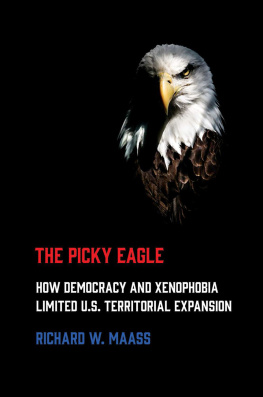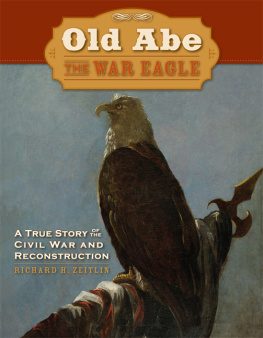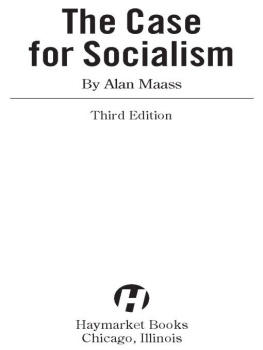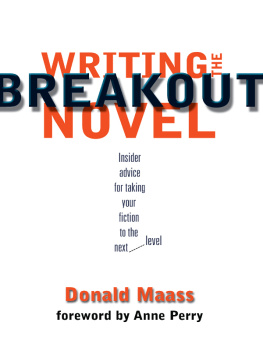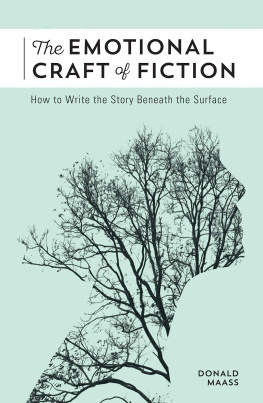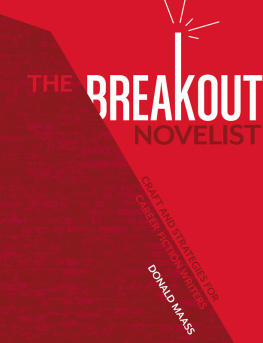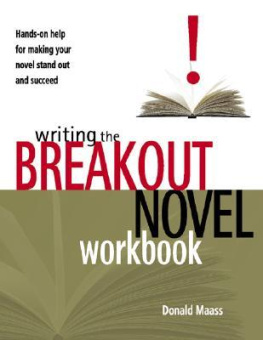Richard W. Maass - The Picky Eagle
Here you can read online Richard W. Maass - The Picky Eagle full text of the book (entire story) in english for free. Download pdf and epub, get meaning, cover and reviews about this ebook. year: 2020, publisher: Cornell University Press, genre: Politics. Description of the work, (preface) as well as reviews are available. Best literature library LitArk.com created for fans of good reading and offers a wide selection of genres:
Romance novel
Science fiction
Adventure
Detective
Science
History
Home and family
Prose
Art
Politics
Computer
Non-fiction
Religion
Business
Children
Humor
Choose a favorite category and find really read worthwhile books. Enjoy immersion in the world of imagination, feel the emotions of the characters or learn something new for yourself, make an fascinating discovery.
- Book:The Picky Eagle
- Author:
- Publisher:Cornell University Press
- Genre:
- Year:2020
- Rating:4 / 5
- Favourites:Add to favourites
- Your mark:
- 80
- 1
- 2
- 3
- 4
- 5
The Picky Eagle: summary, description and annotation
We offer to read an annotation, description, summary or preface (depends on what the author of the book "The Picky Eagle" wrote himself). If you haven't found the necessary information about the book — write in the comments, we will try to find it.
The Picky Eagle — read online for free the complete book (whole text) full work
Below is the text of the book, divided by pages. System saving the place of the last page read, allows you to conveniently read the book "The Picky Eagle" online for free, without having to search again every time where you left off. Put a bookmark, and you can go to the page where you finished reading at any time.
Font size:
Interval:
Bookmark:
Ask big questions. If there is one piece of advice Ive taken to heart, this is it. Big questions concern important subjects; their answers profoundly shape how we understand the evolution and operation of the world around us. Furthermore, big questions end in big question marks. We genuinely dont know the answers when first undertaking to study them. As a result, big questions offer both the opportunity to make a scholarly contribution and the intellectual motivation for a curious mind to persevere through an objectively daunting amount of research. This book was born from my nagging unease that the modern world would look very different if its first unrivaled superpower had continued pursuing conquest instead of outlawing it. It stemmed as well from my curiosity about why the most powerful country in the history of the world had lost interest in something that many other great powers as well as its own early leaders found so appealing.
After devoting a decade of work to this book, I am deeply grateful for the support of mentors, colleagues, friends, and family who have helped me see it through. Mike Deschs genuine interest in this question and his open-mindedness in pursuit of accurate answers reinforced my own, and his consistently thoughtful guidance helped me navigate through early drafts. This book has also benefited immensely from Dan Lindleys unceasing skepticism and ruthless attention to detail, Sebastian Rosatos infectious ambition and read everything thoroughness, and Walter Nugents enthusiasm and care for historical research.
Mike Desch, Dan Lindley, Walter Nugent, George Herring, and Josh Shifrinson each read a heavily revised and expanded draft manuscript, providing valuable feedback at a book conference made possible thanks to funding from the Notre Dame International Security Center and an Alumni Research and Scholarly Activity Fellowship from the University of Evansville. After its submission to Cornell University Press, two anonymous reviewers (who turned out to be Peter Liberman and Scott Silverstone) each read multiple iterations of the full manuscript. Their diligence and insightful recommendations were everything peer review should be, and they played a crucial role in helping me hone the books strengths. I am grateful to Emily Andrew for being a wonderful editor to work with, to Bethany Wasik for her efficient editorial assistance, to Roger Haydon for his early support of the project, and to members of the editorial board at Cornell University Press for their own comments, which helped strengthen the manuscript in its final stages.
Richard Bensel, Daniel Bessner, and Henry Nau each read draft portions of the manuscript and offered generous comments, as did William Ayres, Jonathan Caverley, Dale Copeland, Colin Elman, Holley Hansen, Christopher Layne, David Mayers, Andrew Radin, Marybeth Ulrich, and John Vasquez in conference panels. I thank Matt Evangelista, Taylor Fravel, Jeff Friedman, Paul Huth, Peter Katzenstein, Jonathan Kirshner, Sarah Kreps, Kyle Lascurettes, John Mueller, Barry Posen, Ashim Subedee, and William Wohlforth for thoughtful conversations related to this book. Equally helpful were attendees at related presentations at the annual conferences of the American Political Science Association, the International Studies Association, the APSA and ISA international security sections, the Midwest Political Science Association, the Indiana Political Science Association, the Ivane Javakhishvili Tbilisi State University International Scientific Conference, the Cornell University PSAC series, and the Institute for Qualitative and Multi-Method Research. At Notre Dame, both the book and its author benefited from a vibrant community of young international relations scholars, including Paul Avey, Bobby Brathwaite, Peter Campbell, Ben Denison, Charles Fagan, Kirstin Hasler, Rita Konaev, Soul Park, Ji Hye Shin, and John Stringer. Keir Lieber helped lay its groundwork by emphasizing big questions in early conversations.
Big questions take time to answer, and I owe that time to institutional support from the University of Notre Dame, Cornell University, and the University of Evansville. An Art, Research, and Teaching Grant and an Alumni Research and Scholarly Activity Fellowship from the University of Evansville funded the map, which was designed by Mike Bechthold, as well as the index, which was created by Lisa DeBoer. Related research was funded in part by a Global Scholar Award from the Institute for Global Enterprise at the University of Evansville. Librarians at all three universities greatly facilitated my research as did those at archival collections, including the William Henry Seward Papers at the University of Rochester, the John Bigelow Papers at the New York Public Library, and the National Archives in Washington, DC. Immeasurable credit is due to the numerous librarians and historians nationwide who have worked to preserve and digitize documentary collectionsI shudder to think how long my research would have taken in a prior age.
Finally, I owe the most profound debt of gratitude to my family: Bill and Shelagh, whose love and support enabled me to build any life I chose; Adele and Charlie, whose companionship shaped me more than they know; Ani and Lily, whose future deserves that we improve upon the past; and especially Etuna, who has shared every step of this journey. This book is for her.
CHAPTER 1
Robbery by European nations of each others territories has never been a sin, is not a sin today.
To the several cabinets the several political establishments of the world are clotheslines; and a large part of the official duty of these cabinets is to keep an eye on each others wash and grab what they can of it as opportunity offers.
All the territorial possessions of all the political establishments in the earthincluding America, of courseconsist of pilferings from other peoples wash.
Mark Twain, 1897
Why did the United States stop annexing territory? Mark Twains country was ten times larger than the colonies that declared independence in 1776, the result of expansionism by Thomas Jefferson, James Polk, William Henry Seward, and countless other U.S. leaders. Yet since Twains death in 1910 the United States has made no major annexations. Political scientists and historians alike have highlighted the U.S. shift from territorial expansion to commercial expansion, arguing that transformations in the sources of economic wealth and military power undercut the profitability of further annexations after the mid-nineteenth century. However, this conventional wisdom overstates the importance of material constraints on U.S. expansionism and neglects the main reason U.S. leaders rejected the annexation of their remaining neighbors: its domestic political and normative consequences.
By absorbing external territory into the state, annexation necessarily changes the state. Some of those changes are positivefor example, increasing its future wealth and security by gaining natural resources and population or controlling strategic terrain. These potential benefits may stoke leaders expansionist ambitions. Yet annexation may also change the state in ways that leaders consider negativefor example, distorting its institutions and demographics in ways that undercut their domestic political influence or their normative goals for the state. Even opportunities to pursue annexation that appear profitable in material terms may be undesirable for leaders who fear these domestic costs.
Two factors made the presidents, secretaries, and congressmen who shaped U.S. foreign policy during the nineteenth century especially sensitive to annexations domestic costs: democracy and xenophobia. First, they were acutely aware that their democratic institutions left them vulnerable to domestic political shifts resulting from the assimilation of new populations or the admission of new states. At the same time, they valued those democratic institutions enough to grant all major territorial acquisitions an eventual path to statehood, rejecting endless imperialism and militarized rule as threats to democracy at home (at least until 1898). Second, their xenophobia fueled widespread opinions of neighboring peoples as undesirable candidates for U.S. citizenship. As a result, virtually all viewed large foreign populations as deterrents, sources of moral and cultural corruption that would degrade the United States and undermine the popular sovereignty of their existing constituents if annexed.
Font size:
Interval:
Bookmark:
Similar books «The Picky Eagle»
Look at similar books to The Picky Eagle. We have selected literature similar in name and meaning in the hope of providing readers with more options to find new, interesting, not yet read works.
Discussion, reviews of the book The Picky Eagle and just readers' own opinions. Leave your comments, write what you think about the work, its meaning or the main characters. Specify what exactly you liked and what you didn't like, and why you think so.

